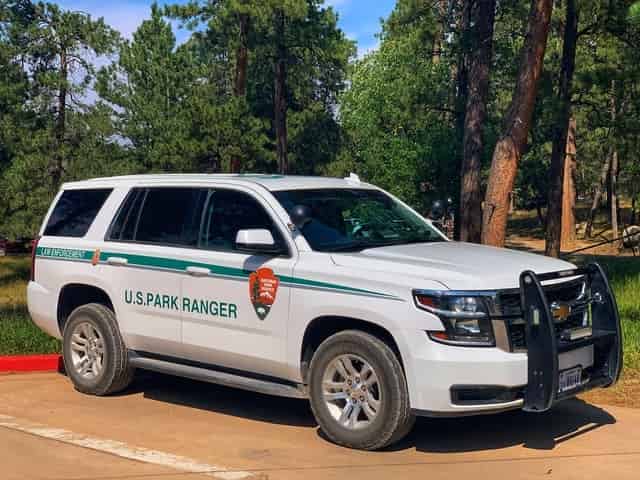
If you spend any time in the great outdoors, you’ve likely crossed passed with a wildlife officer or game warden. These officers of the law typically enforce game and fish rules and regulations…but can a wildlife officer pull you over?
NOTE: This article is based on my interpretation and research, and does not constitute legal advice. Always consult the law in your area.
Table of Contents
- Can a Wildlife Officer Pull You Over?
- Can a Federal Wildlife Officer Pull You Over?
- What Is the responsibility of a Wildlife Enforcement Officer?
- Do Game Wardens Have More Powers Than Cops?
- Conclusion
Can a Wildlife Officer Pull You Over?
Wildlife Officers are sworn law enforcement that work on behalf of the state, which means they can enforce all state laws, including traffic violations. Although rare, a wildlife officer can pull you over if you are breaking the law.
Game wardens serve as conservation and law enforcement officers on private and state lands, where they enforce laws and protect wildlife.
Part of their job requires them to travel between various locations via different modes of transportation. Thus, if they come across you on the road and believe you are breaking some traffic rule, they can pull you over.
However, this depends on the state; some states have varying laws about these as some permit the wildlife officer to pull you over while others limit the officers to maintain their duties in their trained areas.
But that doesn’t mean Game Wardens will stand by on highways to control traffic…you will most likely see them on the roads passing through their jurisdiction.
Wildlife officers have been known to pull people over for drunk driving, operating a vehicle in an unsafe manner, littering, or if they suspect a wildlife violation.
Most of their duties include:
- Inspection of licenses, tags, and license permits used to hunt or fish for wildlife resources.
- Inspect any person found in possession of game resources.
- Intrude into a premise containing wildlife resources, including the storage containers and vehicles used for the purpose.
Can a Federal Wildlife Officer Pull You Over?
Federal wildlife officers are national-level law enforcement, usually with the US fish and wildlife service, Bureau of Land Management, or US Forestry service.
Most of their time is spent traversing different terrain on foot, by horse, boat, and other traveling means fit for their immediate task.
Federal wildlife officers can pull you over within the scope of their mission to conserve, protect, and create public awareness of wildlife and its benefits.
As officers serving in cities, counties, and states of any kind, these officers have total federal-level law enforcement power.
Do Wildlife Officers Need a Search Warrant?
Wildlife enforcement officers perform the duties of police officers when acting in the capacity of an officer when searching your vehicle or home.
Nevertheless, this will not be the case when the police see an obvious crime or have evidence that a crime may have taken place. It is not necessary to obtain a warrant in the latter cases to question you.
Their need for a warrant will also vary depending on the issue they are addressing in their specialized services as land, game, and fish officers. Usually, they can enter your premises when they have probable cause about something within their jurisdiction.
Even though certain states have laws protecting citizens from officers’ unreasonable searches and seizures, those laws are usually no longer relevant in cases such as when in states of emergency, and when trying to obtain a warrant would take more time.
What Is the responsibility of a Wildlife Enforcement Officer?
Wildlife enforcement officers (often called Game Wardens or Conservation Officers) are sworn to protect and uphold wildlife, fish and land resource laws, rules and regulations.
Each of the 50 states has a wildlife agency, employing officers of the law. These are the men and women who patrol the land and water resources in your area upholding the law regarding fish and wildlife.
Additionally, officers are responsible for the protection and well-being of all threatened animal and plant species. They however have different responsibilities and requirements depending on their position within the wildlife department.
In addition to wildlife enforcement officers, there are also game wardens and fish officers who have their job assignments to different states, but with different names. So the relevant law enforcement officers enforce laws within their departments that pertain to their specialization.
Some of the responsibilities of these officers are:
- Issuing warnings on prohibited activities.
- As well as patrolling wildlife areas, they enforce several laws related to fish and boating as well as game laws.
- The officers are also responsible for investigating property damaged by wildlife.
- They implement wildlife management programs to protect game, plants, and fish for future generations.
- They are generally responsible for protecting the integrity of the natural ecosystems.
Do Game Wardens Have More Powers Than Cops?
Despite game wardens’ area of specialization being around wildlife, and nature conservation, they have the powers to work as local county police officers and make any arrests of violations of other laws in their states.
A game warden, however, might have more authority than, a regular police officer, due to the fact they usually have state-level law enforcement capabilities. On the other hand, regular police officers are usually only sworn in at the county or city level.
What Are The Different Types of Game Wardens?
Game Wardens have different names according to the states they serve in they may be called gamekeepers, wildlife officers or conservation officers.
Like most law enforcement agencies, they also have different ranks in their jobs with different specializations and departments.
Patrol and Investigations Officers
These officers patrol their jurisdictions from the seas to the land, carrying out search and rescue operations. They also investigate complaints on game trafficking and other environmental causes.
Citations and Arrests
According to their findings after investigations into game-related cases, the game wardens can take action and impound any lawbreakers, size equipment and make arrests, even on private land..
Court Cases
In addition to their working on court cases, the officers have no exceptions from handling court paperwork. The law as well expects them to be conversant with different laws on civil servants maintaining all standards within civil rights and evidence for presenting in courts.
As a result of human-wildlife conflicts, in case wild animals are hurt by humans, game wardens have to provide first aid to the injured animals with the help of veterinarians.
Search and Rescue
Game Wardens may also participate in search and rescue efforts from land, sea or air. These men and women are highly trained and qualified to patrol and search wild places and rural areas.
Conclusion
In most states, Wildlife officers (commonly referred to as Game Wardens or Conservation Officers) are sworn law enforcement on behalf of the state.
This means they can and sometimes do enforce all state laws including non-wildlife-related infractions such as traffic, drug, assault, etc.
So, yes a wildlife officer can pull you over!
I have the utmost respect for the wildlife officers who patrol and protect our natural resources and the outdoor world.
Stay safe, and thank you for reading!





